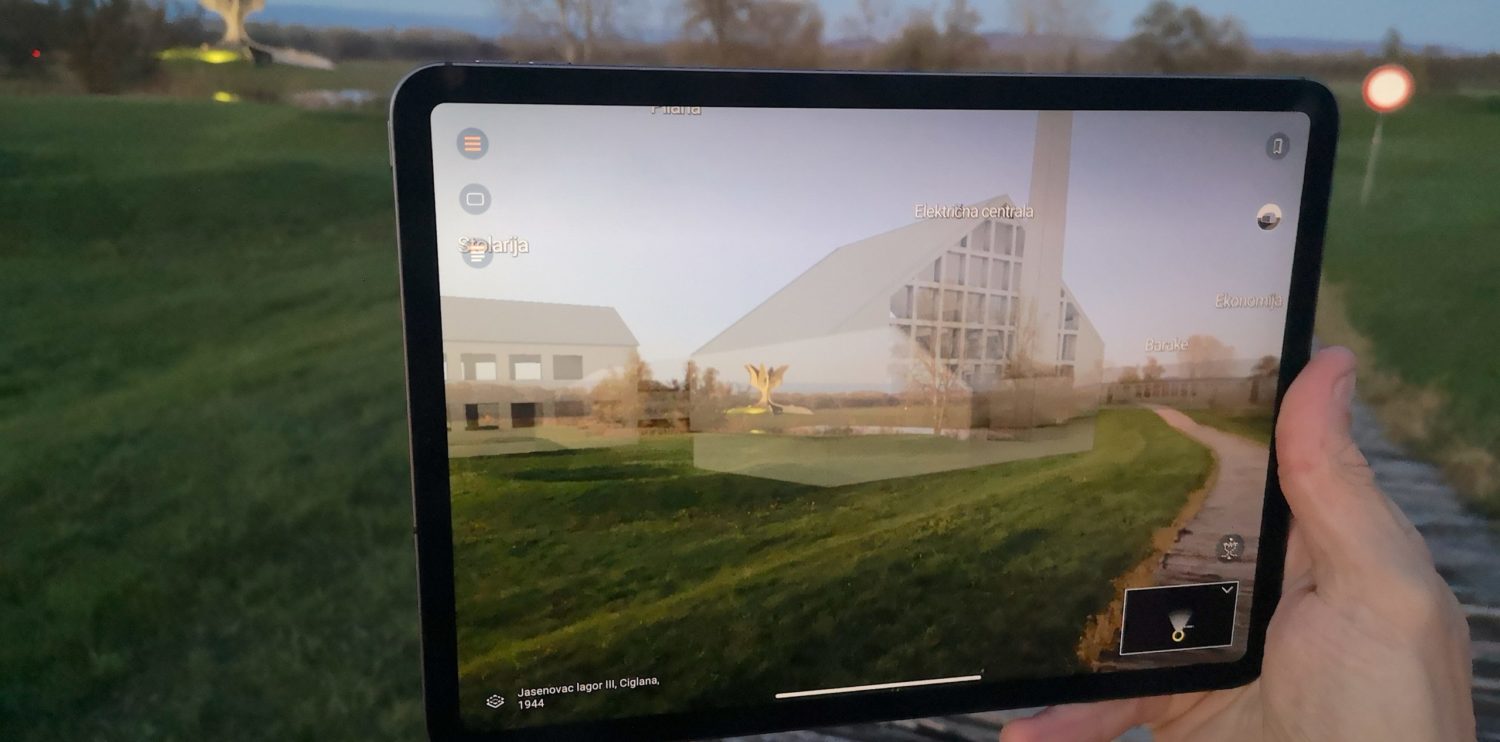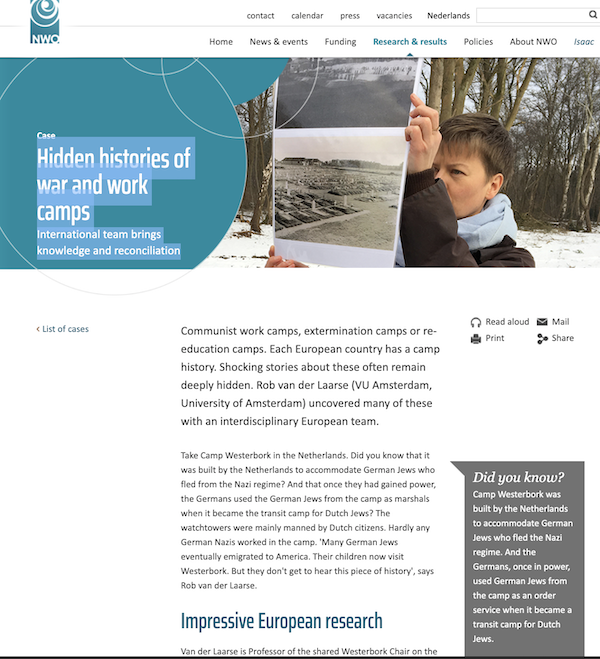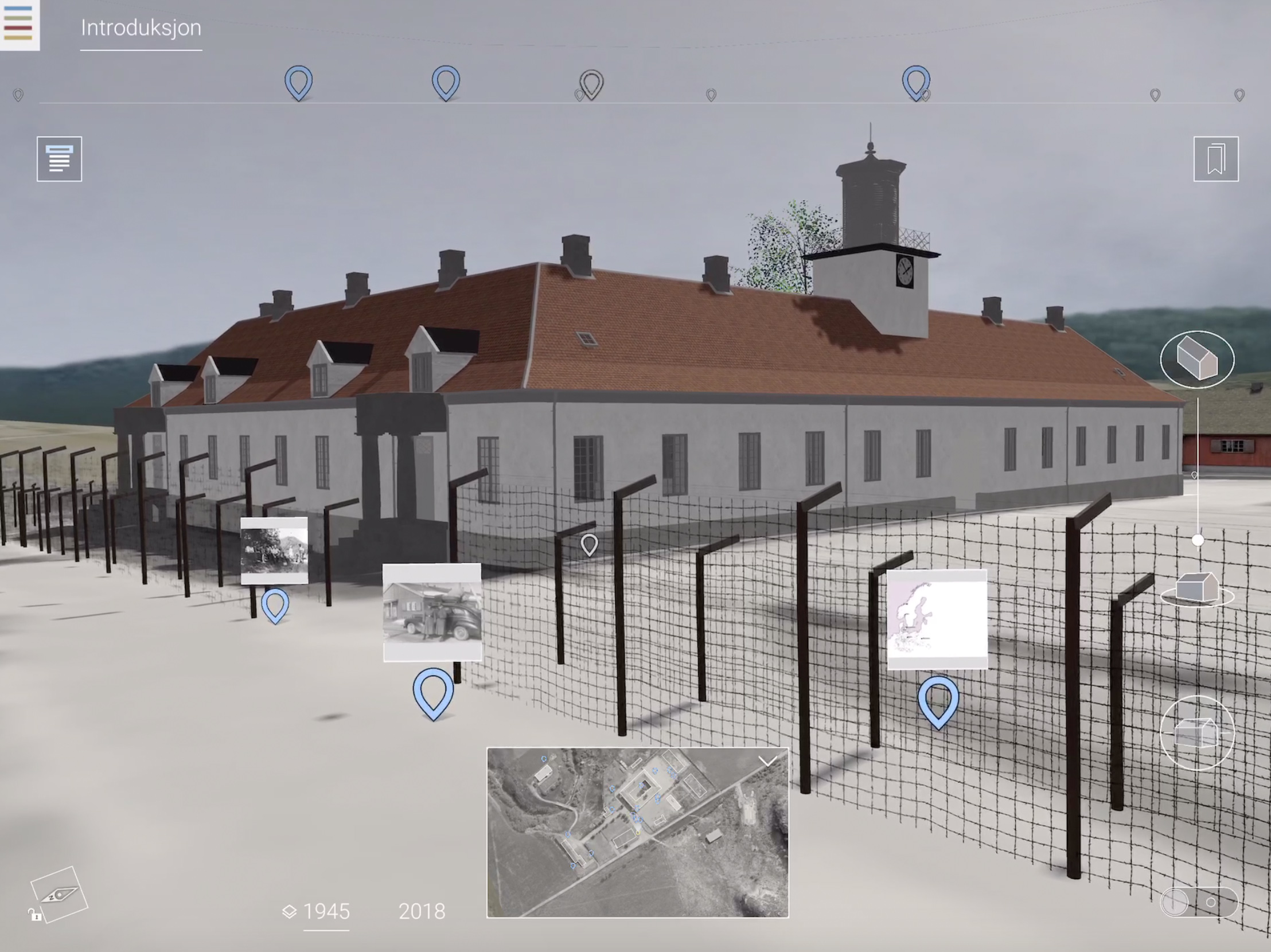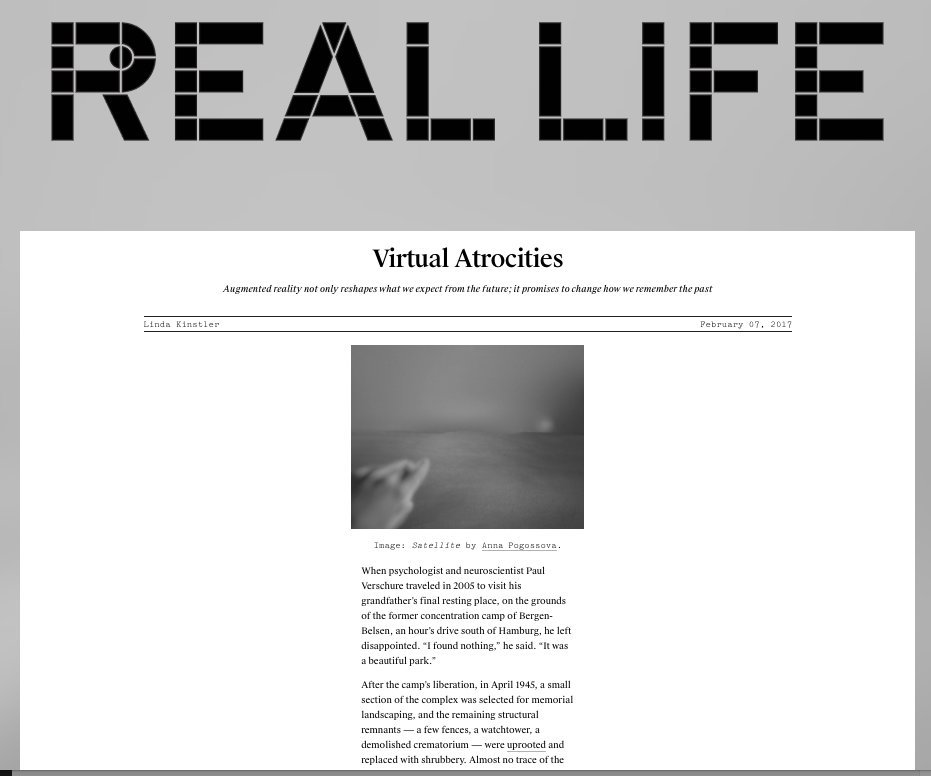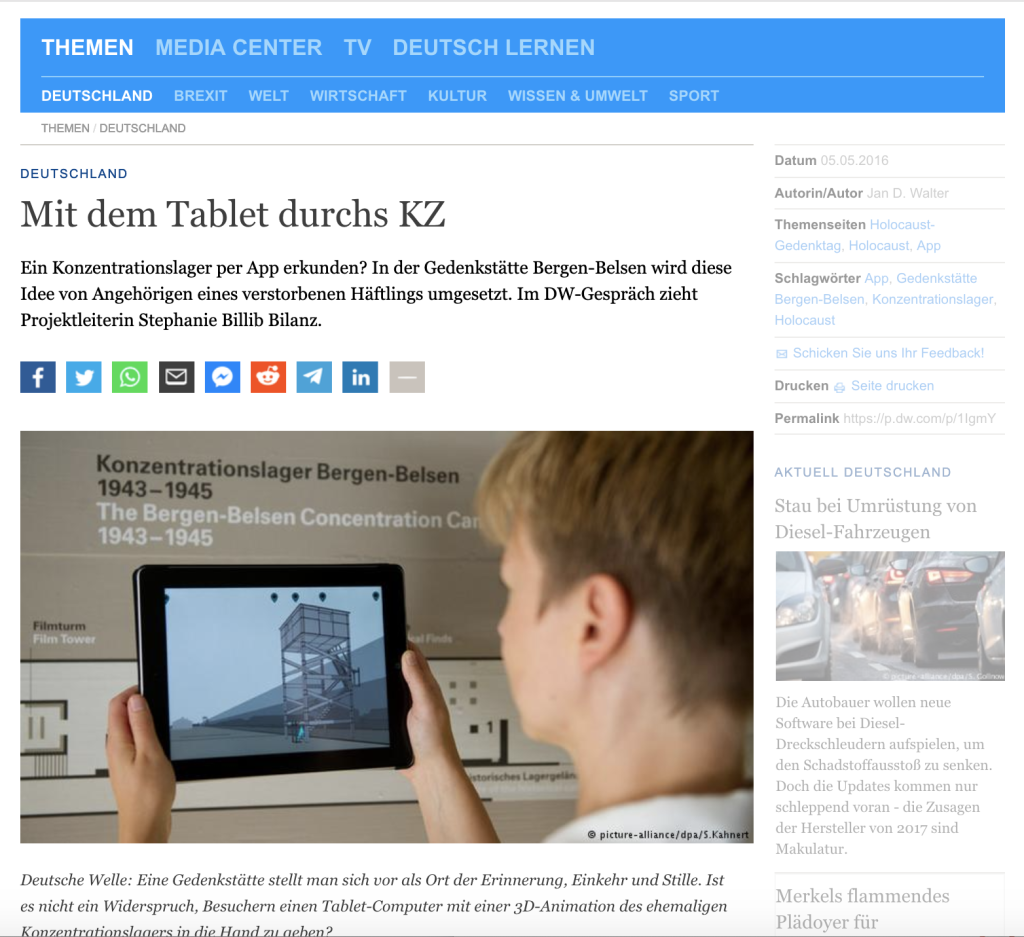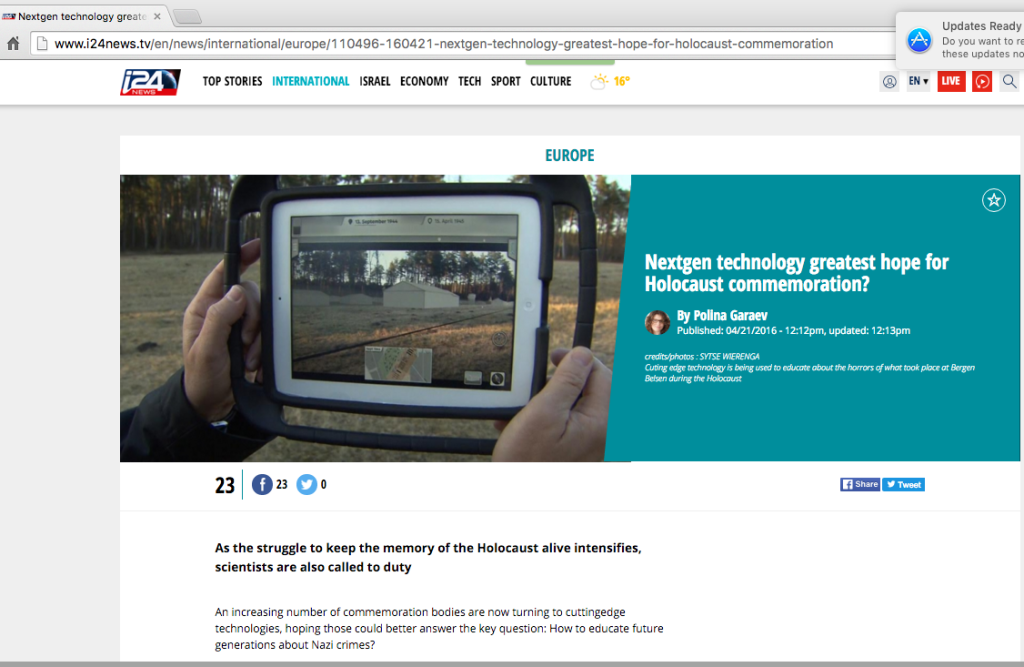“Hidden histories of war and work camps”. Article by NWO
Category Archives: Digital Humanities
The Falstad Center – geolocated digital reconstruction
Via the European research project, iC-ACCESS (Accessing Campscapes: Inclusive Strategies for Using European Conflicted Heritage), where the Falstad center is an associated partner, the “Falstad digital reconstruction” (FDR) was launched in 2018. The FDR is developed in a collaboration between the Falstad center, a Norway memorial, and human rights center, and the Synthetic, Perceptive, Emotive and Cognitive Systems research group (SPECS) at the Institute for Bioengineering of Catalonia (IBEC), and with spinoff company Eodyne. read more at https://www.heritageinmotion.eu/himentry
The Times of Israel: At Westerbork, virtual reality simulations.
At Westerbork, Netherlands ” With almost nothing remaining of the former Nazi transit camp Westerbork, visitors are turning to a simulation that “recreates” the site of Holocaust-era incarceration using virtual reality”
read more at The Times of Israel
Westerbork, virtual reality simulations ‘recreate’ the Nazi transit camp.
HERA iC-ACCESS exhibition: 3D reconstruction of the Westerbork camp
On the 75th commemoration of the transports that left from Westerbork to Bergen Belsen, the iC-ACCESS team (SPECS-lab, UvA) together with Memorial Kamp Westerbork opened a VR interactive installation that grasps the dynamics and memory of the two former camps.
Besides the 3D reconstruction of the Westerbork camp, the VR installation allows the visitors to consult, in parallel, a 3D model already developed for the Bergen-Belsen memorial (developed by SPECS Barcelona in cooperation with GBB).
Virtual Atrocities. by Linda Kinstler
“Augmented reality not only reshapes what we expect from the future; it promises to change how we remember the past”
Article published in Real Life http://reallifemag.com/virtual-atrocities/
iC-Access: Accessing campscapes
iC-access is a HERA funded project (2016-2019 Humanities European Research Area) meant to open global reflections on the past towards a more inclusive awareness of interdependencies, exchanges and communication of historical interpretations and memorial practices in the 20th century. see more at http://www.campscapes.org/
The consortium members are:
- University of Amsterdam, The Netherlands
- Freie Universität Berlin, Germany
- Norwegian University of Science and Technology, Norway
- Staffordshire University, United Kingdom
- University of West-Bohemia, Czech Republic
- Universitat Pompeu Fabra, Barcelona, Spain
THEMEN: Mit dem Tablet durchs KZ
Future Memory interactive App in Catalan TV3
The Future Memory App, for the reconstruction of the Bergen Belsen concentration camp, received some attention by the catalan media and was broadcast today by the catalan television TV3.
In the video, Paul Verschure, ICREA professor and director of the SPECS group at UPF, shows how the Future Memory app is used at the location where the Bergen Belsen camp once stood before it was burned down in 1945 (because of the typhus epidemic) by the English troops just shortly after its liberation (15th of April 1945).
http://www.ccma.cat/tv3/alacarta/noticies-324/una-app-per-visitar-un-camp-dextermini-nazi/video/5598693/
EuroNews: Future Memory Educational App
Future Memory deals with the conservation of European history and identity. In this context and in collaboration with the research group SPECS we are promoting the development of educational paradigms for learning history using digital and interactive technology. see http://www.belsen-project.specs-lab.com/
EuroNews has recently visited us to understand how a scientific and technological approach has helped to develop a tablet application that uses geo-localisation together with virtual and augmented reality to recreate in 3D the Bergen Belsen concentration camp. The same concept and technology will be used to reconstruct other concentration camps that were build by the Nazi Germany throughout the territories it controlled.
For more insights on Cultural Heritage and the Future Memory project see the blog by Paul Verschure
Here Space of Memory: Conserving, Presenting and Elaborating the Memory of the Holocaust and Nazi crimes originally published by the European Commission blog, DAE, on 21/03/2016 and by the CSN blog http://csnblog.specs-lab.com/ on 23/03/2016
This work was partially supported via the EU project CEEDS
Nextgen technology greatest hope for Holocaust commemoration?
The Israeli i24 news reports on SPECS’s science-based technology used to developed a tablet app with the 3D reconstruction of the Bergen Belsen concentration camp.
We are facing a memory crisis,” warns Prof. Paul Verschure, cofounder of the Future Memory Foundation, which tackles this problem. “Not only that the living memory is disappearing, we are also seeing how limited is the commemoration process we have built over the last 70 years. The goal was to help us learn from our past and to better our society, but it’s clearly not working.”
read more @: http://www.i24news.tv/en/news/international/europe/110496-160421-nextgen…
